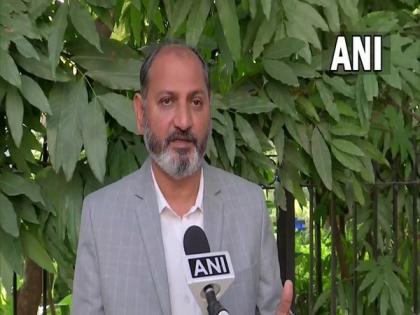India's COVID-19 vaccination programme has become Vishwa Guru, says LNJP Hospital MD Dr Suresh Kumar
By ANI | Published: January 30, 2022 09:56 PM2022-01-30T21:56:45+5:302022-01-30T22:05:07+5:30
After the country achieved the milestone of vaccinating 75 per cent of the country's adult population against COVID-19, Dr Suresh Kumar, MD of Lok Nayak Jai Prakash Narayan Hospital (LNJP) on Sunday said that the country's COVID-19 vaccination programme is an example to the world and it has become a "Vishwa Guru" (world leader).

India's COVID-19 vaccination programme has become Vishwa Guru, says LNJP Hospital MD Dr Suresh Kumar
After the country achieved the milestone of vaccinating 75 per cent of the country's adult population against COVID-19, Dr Suresh Kumar, MD of Lok Nayak Jai Prakash Narayan Hospital (LNJP) on Sunday said that the country's COVID-19 vaccination programme is an example to the world and it has become a "Vishwa Guru" (world leader).
Speaking to ANI, Dr Suresh Kumar said that it is a matter of pride that 75 per cent of the adult population has been vaccinated, which is a major part of the population of the country.
Earlier today, Prime Minister Narendra Modi congratulated citizens of the country as India fully vaccinated 75 per cent of its adult population under the nationwide COVID-19 vaccination drive.
"It is a matter of pride that 75 per cent of the adult population has been vaccinated, which is part of the major population. It is seen that if 60 per cent of the population is vaccinated, then there is a reduction in community transmission," said Dr Kumar.
"India's vaccination programme is an example to the world. It was a big challenge to vaccinate such a huge population, which India has shown to the world and created history. India has become a Vishwa Guru in vaccination program in the world," he said.
Giving details on vaccination in Delhi, he said that 100 per cent of the adult population in Delhi has received the first dose, and 80 per cent has received the second dose.
"About 6 lakhs children in the age group of 15 to 18 years in Delhi have received the first dose, which is a big success for us," he added.
Talking about the current COVID-19 situation in the national capital, Dr Kumar said, "The cases of coronavirus are less now and the positivity rate is currently 6.37 per cent in Delhi. The daily new cases are less than 5,000. In Delhi, only 10.16 per cent of patients are admitted to the hospital."
Dr Kumar further said that at present about 89.84 per cent of COVID-19 beds are vacant. A total of 15,428 beds in Delhi are reserved for COVID-19 patients, out of which only 1,567 beds are full.
"Most of the patients who are getting admitted are those who have a long illness, dialysis or are heart patients or cancer patients. The people who are vaccinated do not need to be admitted. Most of the patients who are dying are those who have not taken the vaccine or have taken only a single dose. Elderly, patients of COPD, patients with multi-system failure, people who are diabetic are facing difficulty in recovering from COVID-19," he added.
The Union Health Ministry said that more than 164.36 crore vaccine doses have been provided to States and Union Territories as a part of the nationwide COVID-19 vaccination drive.
Further talking about the NeoCOV he said "India as of now hasn't seen this new variant (NeoCov). Not much information has come about it yet. We are careful as the virus is continuously changing, new variants, mutants are emerging. We are taking precautions to be more vigilant about such cases."
As per Vinod Scaria, Principal Scientist at Delhi-based CSIR-IGIB, NeoCoV cannot interact with human receptors, implying that in its current form the virus cannot infect humans.
According to Sputnik, Chinese scientists have identified the new NeoCov coronavirus strain in bats in South Africa and the possible risks from the strain require further research and assessment.
Scientists have said that the virus in question is a close relative of the Middle East Respiratory Syndrome (MERS-CoV) but has similar ways of entry into human cells as SARS-CoV-2.
NeoCov has a latent potential to mutate and penetrate the human population.
( With inputs from ANI )
Disclaimer: This post has been auto-published from an agency feed without any modifications to the text and has not been reviewed by an editor
Open in app